Great Minds Think Differently
How people with learning challenges are reshaping the world
The stories within Great Minds Think Differently profile famous individuals, and highlight how their strengths, along with relative areas of weakness, have brought about great success. As we have discovered, the old adage ‘Great Minds Think Alike’ is simply not true.
Throughout history, people who have appeared different from others and who processed information, observed life and learned differently have faced barriers. However, many who dared to embrace the unique ways in which they perceive and understand the world are among those who have been able to achieve the greatest feats within their lifetime. Instead of viewing these people as achieving greatness despite their learning challenges, the stories in Great Minds Think Differently demonstrate how, because of what others may perceive as a disability, great success can be achieved. These inspiring stories challenge us to adjust the way we view the concept of disability, and might even open a door to your own unique, but often hidden gifts!
Mahatma Gandhi
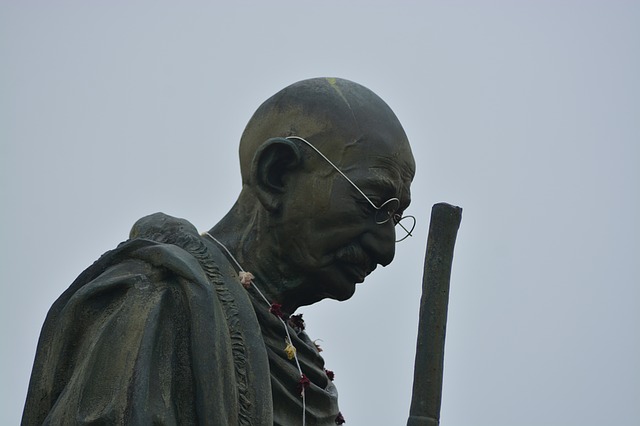
Mohandas Gandhi was one of the most unlikely heroic figures of all time. Despite significant learning difficulties that would challenge him at every turn throughout his youth and a solitary, privileged upbringing in a land of great poverty and suffering, Gandhi would one day become the face of his people’s struggle to the world. He is unequalled in history for his ability to move people to his way of thinking through his inspirational personal example and extraordinary commitment to racial equality and social justice.
Born in 1869 India, Gandhi would one day write of his childhood and his unlikely rise to fame. “My father never had any ambition to accumulate riches and left us very little property.
He had no education. But his rich experience of practical affairs stood him in good stead in the solution of the most intricate questions and in managing hundreds of men.” It would fall to his mother, who through her moral example would first inspire the boy to follow his life’s extraordinary path: “The outstanding impression my mother has left on my memory is that of saintliness.”
In the part of India where Gandhi grew up, Muslims, Hindus and Christians lived side by side, tolerant of each other’s faiths. As the youngest child of a prominent family, he was spoiled and was allowed to do pretty much as he pleased. He disliked school so much that he skipped out of class at every opportunity: “I roamed about the villages in a bullock cart…I may say that I failed to get from the teachers what they could have given me without any effort on their part. And yet I kept on picking up things here and there from my surroundings.”
Although not given a diagnosis of a learning disability as a child, many dyslexic traits are clearly evident in accounts of his life. As a student he complained that he had no aptitude for lessons and rarely appreciated his teachers, especially those who taught in English, a language he learned with great difficulty.
Understandably, Gandhi felt more at ease writing and reading in the local Indian dialect than the foreign English language. English lacks a consistent one-to-one correspondence between letters and speech sounds, so it’s more of a challenge for someone with a learning disability. Not surprisingly, a common sign that a teenager may have a learning disability is an unexpected difficulty with learning some foreign languages.
During his first year in high school he managed to pass basic arithmetic, but received 0 in both geography and English spelling. Gandhi recalled being asked to spell the word ‘kettle’ in a spelling bee: “I misspelled it… The result was that all the boys, except myself were found to have spelled every word correctly. Only I had been stupid. Gandhi never would learn to spell English words correctly that are not spelled exactly as they sound. ‘Kettle’ for example, is a typical word for children with a learning disability to stumble over, as its spelling does not directly correspond to the way it sounds.
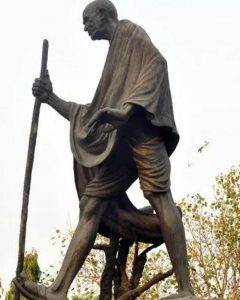 Like many individuals with learning challenges, Gandhi believed that he had no gift for learning, and might have been better off if he had never been to school. “The fact that I recollect nothing more of those days than having learnt, in the company with other boys, to call our teacher all kinds of names, would strongly suggest that my intellect must have been sluggish, and my memory raw.”
Like many individuals with learning challenges, Gandhi believed that he had no gift for learning, and might have been better off if he had never been to school. “The fact that I recollect nothing more of those days than having learnt, in the company with other boys, to call our teacher all kinds of names, would strongly suggest that my intellect must have been sluggish, and my memory raw.”
For most people who have a learning disability, doing multiplication is much more difficult than memorizing basic addition and subtraction rules. Not everyone who has difficulty with math has a learning disability, but research indicates that, of those who do experience difficulties with mathematics, most will have co-occurring dyslexic symptoms. Sequencing difficulties, or trouble with remembering the order of operations required to solve more complex problems, can interfere with counting, but more commonly has a more significant impact on one’s ability to complete more difficult mathematical operations, as was the case for young Gandhi.
Gandhi did relatively well in some subjects and dismally in others, which is commonly the case for individuals with learning disabilities. He performed better in the subjects that he enjoyed, and those with personal relevance, such as the study of the ancient language, Sanskrit.
The education of children in most all of the world, a century ago, was largely the basic repetition of lessons, demanding little in the way of understanding meaning or significance. Reading, writing and arithmetic would never come quickly or easily to Gandhi. He would recall, “There is hardly anything to note about my studies. I could only have been a mediocre student. To be at school at the stroke of the hour and to run back home as soon as the school closed-that was my daily habit. I literally ran back, because I could not bear to talk to anybody. I was even afraid lest anyone should poke fun at me.”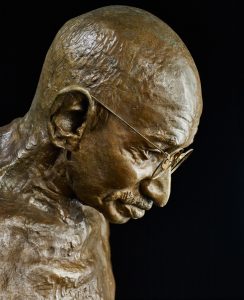
After two years in primary school, Gandhi entered high school, losing marks for poor handwriting, he just squeaked by on the entrance examination. All his life, Gandhi would be embarrassed by his poor spelling and scratchy, barely legible handwriting that slopped unevenly across the page. He later revealed his regrets in his autobiography: “When I saw the beautiful handwriting of lawyers, I was ashamed of myself and repented my neglect. I tried later to improve mine, but it was too late.” Later in life, he would dictate all his correspondence and only need to scrawl his name at the bottom.
Gandhi refused to allow challenges with formal education to hold him back from a successful future. If he had lived today, he could turn for assistance, as many people with a learning disability do, to technology such as the keyboard and spell-check. Today, India’s population of over one billion ranks first in the use of text messaging, which is a very different scenario from the days of Gandhi, where words were written instead of typed, and spelling along with legible hand-writing were believed to be essential skills for success.
Gandhi stubbornly avoided participating in sports, as he was both shy and physically uncoordinated. Children with certain types of learning disability can find it harder than their peers to skip, hop, balance, or kick a ball. Poor hand-eye coordination for sequenced movements is commonly found in children with dyslexia. There is evidence that in individuals with dyslexia, the development of the cerebellum is mildly impaired; compromising their postural control, balance, eye coordination and motor planning for sequenced movements. Looking back at his school days he would remember, “I never took part in any exercise, cricket or football, before they were made compulsory.”
During his law studies later in life, he realized that it was also a great challenge to not only read music, but also to coordinate hand movements necessary to play an instrument. Following the rhythm of music and dance was found to be another problem altogether.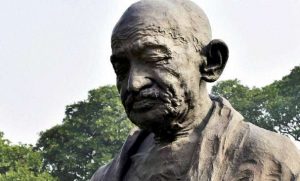
“I must have taken about six dance lessons in three weeks. But it was beyond me to achieve anything like rhythmic motion. I could not follow the piano and hence found it impossible to keep time.”
It is common for people with a learning disability to find it hard, as Gandhi did, to clap in time to a rhythm, and execute coordinated hand-eye movements necessary to be successful in sports and music. The difficulties Gandhi had with sports and music forced him to re-route his path to success. It had suddenly dawned on him that he didn’t need to focus on activities for which he had no natural ability but rather concentrate on areas in which he might excel. He heard: “the bell of alarm in my ear and I awoke. What then was the use of learning elocution? I was a student and ought to go on with my studies.”
After high school, Gandhi set out to obtain a college degree, which was an essential step to realizing his dream of practicing medicine. Unfortunately, within a few days, he found himself hopelessly lost. His inability to concentrate on his lessons made it virtually impossible to absorb the study material. On his first tests he received 13% in math, and 18% in history. “I went, but found myself entirely at sea. Everything was difficult. I could not follow, let alone take an interest in, the professor’s lectures. It was no fault of theirs. The professors in that college were regarded as first-rate. But I was so raw. At the end of the first term, I returned home.”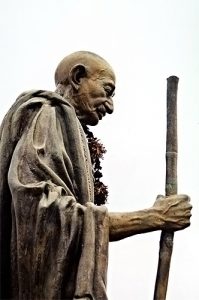
Anyone experiencing failure with learning new languages, sports, music, mathematics and spelling may simply give up. However, Gandhi did not give up, and focused on his strengths.
Long before he learned to write, Gandhi liked to scribble his own made-up language on the floor with chalk. He also enjoyed sitting alone in the family courtyard, making clay sculptures with his hands. Sculpting requires advanced spatial awareness skills, or an understanding of where objects fit in space, in relation to other objects. It is common for people with a learning disability to find that they have a superior talent for understanding the dimensions of shapes in space, although the same processes for symbols, such as letters, can be difficult. Gandhi continued to excel with hands-on learning tasks throughout his life. He had an extraordinary ability to visualize objects in a moved or altered state, and visualize the big picture.
What he remembered most of his childhood was practicing the long sing-song recital of his family tree. Seventy years later, he could still remember the names and locations of all of his distant ancestors that he had memorized as a child. Like many people who have difficulty learning, once he had managed to commit information to memory, Gandhi was able to retain and recall these important facts throughout his life. Memorization skills helped him to focus on the big picture, and avoid getting caught up in smaller details.
Most people with dyslexia spell far worse than they read. Although Gandhi would never find pleasure in reading English, his learning difficulties did not keep him from being drawn to tales of Indian super heroes. “Somehow my eyes fell on a book purchased by my father. It was a play about Shravana’s devotion to his parents. I read it with intense interest. The book and the picture left an indelible impression on my mind.”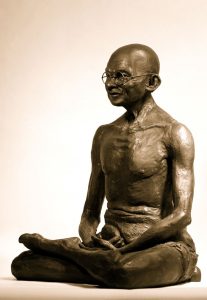
Throughout life, Gandhi would be motivated by a strong desire to prove that he wasn’t stupid. He realized at an early age that he needed to work harder than others to achieve his goals. In spite of his failing grades, he still managed to hold out hope that his future would somehow become brighter. You can sense this hopefulness later in life when he remarked that he felt he was no longer widely thought of as a ‘dunce.’
Speaking in public presented a great challenge for Gandhi. On his first attempt to read a speech, he experienced a common obstacle that many people with learning challenges must overcome if they wish to pursue careers in public service. “I stood up to read it, but could not. My vision became blurred and I trembled, though the speech hardly covered a sheet of foolscap….I was ashamed of myself and sad at heart for my incapacity.”
His next attempt was not much better, although for the first time he tried to commit his speech to memory. “I had with great care thought out one which would consist of very few sentences. But I could not proceed beyond the first sentence…My memory entirely failed me and in attempting a humorous speech I made myself ridiculous.” Although his audience had trouble hearing him and he had to hand his notes off to someone else to finish reading, this first major speech was well received for its content.
Gandhi also had a distracting habit that while searching for the right word during a speech, he would pause and gasp for breath. “I must say that, beyond occasionally exposing me to laughter, my constitutional shyness has been no disadvantage whatever. In fact I can see that, on the contrary, it has been all to my advantage. My hesitancy in speech, which was once an annoyance, is now a pleasure. Its greatest benefit has been that it has taught me the economy of words….A man of few words will rarely be thoughtless in speech; he will measure every word.”
He soon realized what many people with these types of challenges eventually discover: that the most effective method of public speaking requires committing presentations to memory and practicing the delivery repeatedly before addressing an audience. Gandhi never did become the conventionally gifted orator he had imagined, but he was eventually able to see his unique speaking style as a benefit to him, in creating dramatic effect. Public speaking was later seen as an area of strength, not weakness due to his refusal to give up, and ability to find creative solutions to the difficulties he faced.
Support networks are essential for all people to attain success and in particular, people who have disabilities. For Gandhi, aside from the spiritual example set by his mother, he said that the two people who had the greatest influence on his beliefs and in particular, his commitment to non-violence were the Indian poet Raychandbhai and the writer Tolstoy. Of Tolstoy, he viewed himself “a humble follower of that great leader whom I have long looked upon as one of my guides.”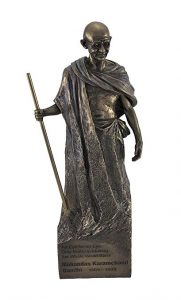
Despite the fact that Gandhi had demonstrated little ability for schooling, his family still had faith in his ability to succeed. They sold off the family jewels in order to send him off to England to pursue a law degree. Fortunately for Gandhi, receiving a degree at that time, meant little more than paying the fees and showing up for class. Gandhi graduated with no one discovering his dark secret. Throughout his school years, he experienced one of the greatest fears of people with a learning disability; the gnawing worry of being found out, of being seen as a fraud. It is not uncommon for people with learning disabilities to view their different learning style in this way, particularly if they have never been formally diagnosed. Continuous incidences of failure in life, particularly with academics and sports, can lead individuals to believe that they are inferior to others.
Children with a learning disability often develop many strategies to mask their weaknesses in reading and writing. Seeking to be invisible, they can become masters of cover-up and often manage to progress through whole grades without being identified as having challenges. It is typical for such children to be obliging, sweet-natured and attempt to blend into the background at school, just as Gandhi did. He reportedly became a master of this particular coping strategy. His ability to seek out those who could help him succeed, and fool those who doubted him would be helpful in bringing about his later successes.
Gandhi began his new career as a lawyer in South Africa and soon found himself on the wrong side of the law. Arriving at court he breached their accepted dress code by wearing a turban. He refused the judges order to remove it and walked out of court. Gandhi later wrote: “I wrote to the press about the incident and defended the wearing of my turban in the court…. Some supported me, while others severely criticized my temerity.”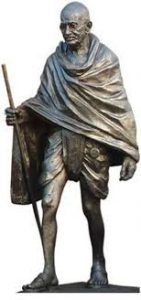
With this simple act of defiance, Gandhi began his career as a social activist. His legal team eventually won this court case but Gandhi soon faced an even darker example of human injustice. Settling into his seat on a South African train, with first class ticket in hand, he was ordered to go to the lower class segregated compartment. When he refused they removed him from the train. Gandhi would later say that his political mission in life began on that night, as he sat shivering beside the train tracks. As with many individuals who have learning disabilities, it was only after his formal education ended that he found his true calling, outside of the walls of the traditional education system.
Gandhi was now much better prepared to challenge the South African justice system. As the new voice of the Indian people of South Africa, he successfully led the legal fight against unfair tax laws.
When the government moved to force all Indians to be registered and fingerprinted on threat of deportation, Gandhi declared:” There is only one course open to someone like me – to die, but not to submit to the law!” In response, his entire audience rose and pledged themselves to go to jail rather than obey the new laws. When the law was then passed, Gandhi received the first of many prison terms.
On his release from jail, Gandhi returned home to India, where he was welcomed as a hero, called ‘the great Gandhi,’ the man who had stood up for the dignity of India in South Africa. Now was his time to stand up for the dignity of his homeland by taking on Britain.
Gandhi first travelled by train across India to meet his people and share with them his belief in non-violent resistance. Traveling third-class and wearing nothing but a white loincloth, he finally discovered the simplicity of living he had craved for so long. His near-nakedness became a symbol of both his own humility and his bond with his people. His growing throng of followers now called him out of respect, their father ‘Mahatma.’
Following the Amristar massacre, where defenceless Indian’s were killed by police, Gandhi was criminally charged for calling for the overthrow of the government.
At trial, Gandhi surprised the court by pleading guilty and demanding to be punished: “I want to avoid violence. Non-violence is the first article of my faith. I do not ask for mercy. I am here, therefore, to invite and cheerfully submit to the highest penalty that can be inflicted upon me”. Again he was imprisoned and went on a hunger strike.
On January 26, 1930, Gandhi published a Declaration of Independence and asked all Indian’s to fly a new flag: We have to talk like simple men. I have no desire to appear extra intelligent. Like a simple villager all I have to say is: ‘We want independence.’”
Had Gandhi not struggled through school, and perceived himself as being no different from the uneducated masses, he likely would not have gained such wide support. Had he not learned to persevere, his civil rights struggle may not have gone to the lengths it had through his strength and determination.
Gandhi learned to keep his message true and to the point. When he accomplished this connection with his people, the words he spoke took the continent by storm. For a short time, all over India, untouchables were welcomed into Hindu temples. Unfortunately, such new-found tolerance was not to last and Gandhi’s fasting only brought a short respite from the terrible violence that was about to consume the land.
All his life, Gandhi had dreamed of a peaceful India where all people lived together as one. It was not to be. Muslims and Hindus demanded self determination for their separate peoples so India was divided between them. At the moment when freedom from the British was at hand, the dream died and the dreamer soon followed.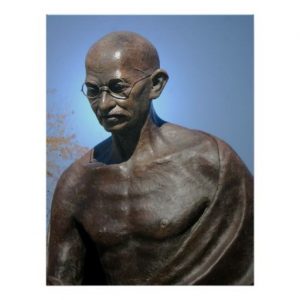
Gandhi had shown the world that peace was a force more powerful than violence. He remained convinced that if people were to open themselves up to the simplest truths of life, that they could overcome all barriers. Nearing the end of his life he would say: “I have nothing new to teach the world. Truth and non-violence are as old as the hills.”
In life, Mahatma Gandhi had brought the gift of self determination to a people who had been thought powerless. In death, his simple message of truth is still found in the aspirations of all people seeking to overcome seemingly insurmountable obstacles. Scientist, Albert Einstein who also overcame learning challenges, wrote the following memoriam for the little man who taught the world of the power of love: “Generations to come, it may be, will scarcely believe that such a one as this ever in flesh and blood walked upon this earth.